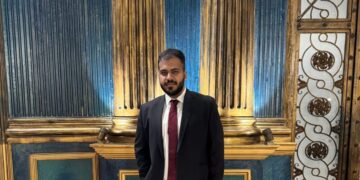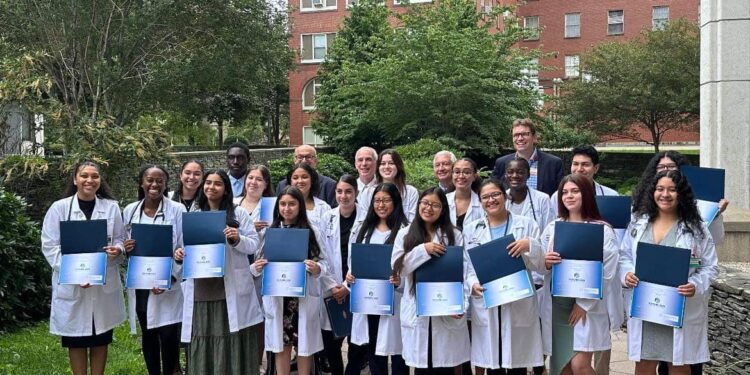No matter what you do, where you live, or who you are, you are likely to be touched by cancer during your life.
In disadvantaged communities across the US there is a level of distrust of institutions, including the medical profession. This leads to a reductionin cancer screening, higher cancer stage at diagnosis and increased mortality among minorities from cancer. Increasing the number of minority physicians, including cancer specialists, may reduce this mistrust.
This is the mission of theRhode Island-based Future Gen Cancer Scholars Program.
Created in collaboration with the physicians, researchers, and administrators at theLifespan Cancer Institute and with faculty at the Warren Alpert School of Medicine at Brown University, the Future Gen Cancer Scholars Program is a two-year programthat aims to inspire Hispanic, Black, Native American, and Indigenous students of color to enter careers in cancer treatment and research.
The program is sponsored by The Papitto Opportunity Connection (POC), a non-profit foundation that supports diversity, equity, and inclusion by investing in education, job skills training, and entrepreneurial ventures in underserved communities.
One of the founders of the Future Gen program is Howard Safran, MD, who is also the director of the Division of Hematology/Oncology at the Lifespan Cancer Institute and the Medical Director of the Brown University Oncology Group.
As a national leader in the treatment of pancreatic and esophageal cancer, Dr. Safran wants to use his years of experience – plus those of his colleagues – to inspire a new generation of doctors.
“Many public high schools in urban centers struggle in STEM education.The scholars in the Future Gen program are minority public high school students beginning after completion of 10th grade. The Future Gen program helps solidify students’ desire to become leaders in cancer care and may provide a path forward to achieve this goal.”
To that end, each new cohort of the program involves 20 participants from public high schools across the Providence, Central Falls, and Pawtucket areas of Rhode Island. The Future Gen team collaborates with school leaders to pick the most appropriate students to apply for the program.
Multiple training sessions are provided before the program begins. Accepted applicants receive training in professional conduct, protected health information, conflict resolution,and other skills necessary to shadow physicians in inpatient and outpatient settings.
“We hope that these scholars will become leaders in cancer care, research and prevention and return to work in their communities to inspire trust in medicine.”
Over the six weeks of the program each summer, the curriculum includes physician shadowing, radiology, pathology, student run tumor boards, seminars, and community outreach.
“The opportunity to access training from some of our country’s greatest medical minds, attend lectures, receive individual performance feedback, and be personally involved in patient cases, all help to make this program one-of-a-kind.”
Traditionally, medical internships for high school students would involve and focus on working in a laboratory. In the Future Gen program, scholars are instead able work directly with clinicians. Participants learn how to take a patient’s medical history, listen to the heart and lungs with a stethoscope, review medical literature, and analyzelaboratory and radiologic studies.
And the benefits don’t stop there:
“Every scholar is an employee of the hospital during the program. That means they get paid a fair wage with good hours so that they aren’t overwhelmed. These students would traditionally need to take full-time summer jobs to support their families – we wanted them to be rewarded for the time and dedication they each put into the program.”
In addition to working two successive summers after their sophomore and junior year, students participate several times during the school year helping with seminars at their individual high schools with topics such as cancer prevention, nutrition, and healthy habits. In their senior year, Future Gen Scholars receive advice on college applications and can receive letters of recommendation.
With a vision as brightas this, there is no limit to what the Future Gen program can help these young scholars achieve – and the team believes there is global potential for the program.
“We believe that our model can be replicated all around the world, to give promising students in disadvantaged communities the opportunities they need to achieve their dreams. These are future leaders, and we can’t wait for the amazing stories that will be told about them someday.”
To find out more about Future Gen’s pioneering program, visit futuregenri.org.





























